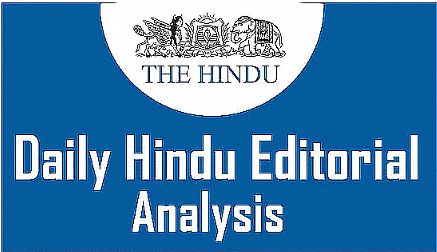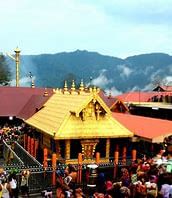The Hindu Editorial Analysis- 15th February 2024 | Current Affairs & Hindu Analysis: Daily, Weekly & Monthly - UPSC PDF Download

A Demand that could Hamper Gender Equality
Why in News?
The Sabrimala temple issue was one that ruled our collective consciousness. It was unfathomable that menstruating women were deemed ‘unfit’ to enter a temple. Echoes of ‘menstruation is not a disease, but a natural phenomena’ could be heard all around. This was a case that highlighted the ongoing struggle to eliminate discriminatory practices related to menstruation, and to promote gender equality.
Sabarimala Temple – Background
- The Sabarimala Temple stands as an embodiment of Kerala's rich cultural heritage and religious diversity. Nestled within the enchanting forests of the Periyar Tiger Reserve, the temple is dedicated to Lord Ayyappa, a revered deity who holds a special place in the hearts of millions of devotees.
- The temple's origins trace back to ancient times, with roots that intertwine Hinduism and indigenous practices. Its rituals and customs are a reflection of the region's historical journey, forming a profound connection between the past and the present.
Why Women Are Not Allowed in Sabarimala?
- At the heart of the Sabarimala Temple issue lies a deeply entrenched practice that has raised eyebrows and sparked debates.
- The tradition of barring women of menstruating age (10 to 50 years) from entering the temple is rooted in a complex interplay of religious beliefs and customs.
- Devotees who adhere to this practice believe that Lord Ayyappa, as a celibate deity, should not be exposed to the energy associated with menstruation.
- This practice is seen as a mark of respect for the deity's vow of celibacy, reflecting a cultural and spiritual sentiment that has been passed down through generations.
Sabarimala Issue: A Clash of Values and Rights
- The Sabarimala issue transcends the realm of tradition, emerging as a potent intersection between religious practices and constitutional rights.
- The core of the debate rests on whether the practice of barring women's entry infringes upon their fundamental rights.
- Advocates for gender equality contend that the prohibition violates women's right to equality and freedom of religion.
- This clash between cherished customs and constitutional guarantees has transformed the Sabarimala issue into a litmus test for the delicate equilibrium between faith and individual rights.
Sabrimala Temple Case Judgment
- The turning point in the Sabarimala Temple issue arrived in September 2018 when the Supreme Court of India delivered a momentous judgment.
- The apex court, in a historic decision, lifted the age-old ban on the entry of women of reproductive age into the temple. The judgment was hailed as a landmark victory for gender equality and a progressive step toward dismantling gender-based discrimination in religious spaces.
- However, this verdict also reignited the debate over judicial intervention in matters of faith and the potential ramifications for deeply entrenched traditions.
Entry of Women to Sabarimala
- The Supreme Court's verdict marked a seismic shift in the dynamics surrounding the Sabarimala Temple.
- It heralded a new era where women of all ages were permitted to step foot within the sacred precincts.
- This watershed moment was celebrated by proponents of gender equality and women's rights, while also sparking a wave of resistance.
- The Kerala government, tasked with implementing the court's ruling, faced formidable challenges as traditionalists and devotees expressed their dissent through various forms of protest.
Some Important Supreme Court Judgments on the Essence of Religion
- The Sabarimala Temple issue is not an isolated occurrence but rather part of a larger legal discourse that delves into the interface between religious practices and constitutional principles.
- Over the years, the Supreme Court of India has pronounced several critical judgments that elucidate the contours of the relationship between religion and law.
- Cases such as the Shah Bano case, the Haji Ali Dargah case, and the Sabarimala judgment have served as significant milestones in shaping the jurisprudential landscape that defines the delicate balance between religious beliefs and individual rights.
- Shah Bano Case: In 1985, the Supreme Court's verdict in the Shah Bano case stirred significant discussions about the intersection of religious practices and gender justice. Shah Bano, a Muslim woman, sought maintenance from her husband after their divorce. The court ruled in her favor, emphasizing that the right to maintenance is not confined by personal laws but is a fundamental right guaranteed by the Constitution. This judgment sparked debates about the uniform civil code and the need to harmonize personal laws with constitutional principles.
- Hindutva Case: The Hindutva case, officially known as the S.R. Bommai v. Union of India (1994), dealt with the role of religion in politics. The Supreme Court ruled that seeking votes in the name of religion, caste, or language is a corrupt practice and a violation of the model code of conduct. The judgment aimed to prevent the exploitation of religious sentiments for political gains, highlighting the court's concern for maintaining the secular fabric of the nation's democracy.
- Haji Ali Dargah Case: The Haji Ali Dargah case (2016) revolved around the restriction on women's entry into the inner sanctum of the Haji Ali Dargah in Mumbai. The Supreme Court held that women's fundamental right to equality and non-discrimination cannot be compromised under the garb of religious practices. This verdict echoed the broader principle that religious customs should not infringe upon basic fundamental rights.
- Adultery Verdict: While not solely a religious case, the Supreme Court's 2018 judgment decriminalizing adultery reflects evolving societal norms and challenges traditional perceptions of morality associated with religious beliefs. This judgment underscored the autonomy of individuals within marriages, signaling a departure from historical notions of women as property and reinforcing principles of individual agency.
Protests after Sabarimala Verdict of the Supreme Court
- The aftermath of the Supreme Court's verdict witnessed a surge of emotions reverberating through the land of Kerala and beyond.
- The decision ignited a fervent outpouring of support and dissent, with devotees, religious groups, and various sections of society expressing their opinions through a multitude of avenues.
- The protests were emblematic of the deeply entrenched emotional and cultural ties that individuals and communities hold with the Sabarimala Temple and its age-old practices.
Views of Leaders and Parties on the Issue
- The Sabarimala Temple issue transcended its religious boundaries and cast its influence over the political and social spectrum.
- Leaders, parties, and organizations from diverse walks of life weighed in on the matter, lending their voices to a discourse that spans far beyond the temple's ornate gates.
- The kaleidoscope of opinions reflects a spectrum of beliefs, ranging from staunch advocates of gender equality to fervent defenders of time-honored traditions.
Conclusion
The Sabarimala Temple issue embodies the intricate interplay between tradition and change, religion and rights, beliefs and equality. As the debates continue and the society grapples with this complex matter, it is evident that the issue extends beyond the temple's sanctum sanctorum. It challenges us to introspect and find a harmonious coexistence between the cherished past and the evolving present.
|
59 videos|5398 docs|1143 tests
|

















